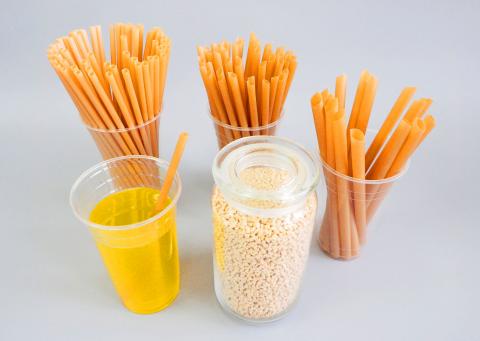Taiwanese start-up 100% Plants turns sugarcane byproducts into polymer raw materials that are used to make biodegradable straws, potentially opening new avenues for research into sustainable alternatives for plastic.
Simple chemical aggregation methods would be sufficient to render sugarcane by-products, or bagasse, into polymer raw materials, which could be used to manufacture biodegradable straws, 100% Plants founder Huang Chien-chung (黃千鐘) said on Friday.
Developing the processes was not without its challenges.

Photo: Chen Feng-li, Taipei Times
The first factory that they collaborated with complained that the materials were “unusable,” Huang said, adding that solutions necessitated modifying the factory’s machines.
After calibrations and tests, a product was produced that would not crack or splinter, even when subjected to temperatures of minus-20°C, Huang said.
The company is collaborating with National Taiwan Ocean University to determine the product’s rate of degradation when submerged in ocean water or in fish stomach acid, he said.
“We hope that the test results will prove that our product is environmentally friendly,” Huang said.
The Rural Development Foundation fully supports the start-up’s idea, foundation president Hsieh Chih-cheng (謝志誠) said, adding that using what would otherwise be considered agricultural waste as a substitute for polyethylene is practical and eco-friendly.
The start-up is researching using discarded bamboo to manufacture one-time utensils, with a prototype undergoing tests in the US and Australia, he said.
The company’s efforts have attracted the attention of several French tourist destinations, as France’s Energy Transition for Green Growth Act intends to ban plastic plates, cups and utensils by 2020, he added.
The start-up is in talks with the localities regarding the possibility of turning grape bagasse and barley pulp into useful products, Huang said.
The start-up has refused offers from more than 20 Chinese companies over the past two months wishing to buy its technology, he said.
“We do want to make money, but we give an even higher priority to working with the international community as a Taiwanese company,” Huang added.

Chinese Nationalist Party (KMT) Chairman Eric Chu (朱立倫), spokeswoman Yang Chih-yu (楊智伃) and Legislator Hsieh Lung-chieh (謝龍介) would be summoned by police for questioning for leading an illegal assembly on Thursday evening last week, Minister of the Interior Liu Shyh-fang (劉世芳) said today. The three KMT officials led an assembly outside the Taipei City Prosecutors’ Office, a restricted area where public assembly is not allowed, protesting the questioning of several KMT staff and searches of KMT headquarters and offices in a recall petition forgery case. Chu, Yang and Hsieh are all suspected of contravening the Assembly and Parade Act (集會遊行法) by holding

PRAISE: Japanese visitor Takashi Kubota said the Taiwanese temple architecture images showcased in the AI Art Gallery were the most impressive displays he saw Taiwan does not have an official pavilion at the World Expo in Osaka, Japan, because of its diplomatic predicament, but the government-backed Tech World pavilion is drawing interest with its unique recreations of works by Taiwanese artists. The pavilion features an artificial intelligence (AI)-based art gallery showcasing works of famous Taiwanese artists from the Japanese colonial period using innovative technologies. Among its main simulated displays are Eastern gouache paintings by Chen Chin (陳進), Lin Yu-shan (林玉山) and Kuo Hsueh-hu (郭雪湖), who were the three young Taiwanese painters selected for the East Asian Painting exhibition in 1927. Gouache is a water-based

Taiwan would welcome the return of Honduras as a diplomatic ally if its next president decides to make such a move, Minister of Foreign Affairs Lin Chia-lung (林佳龍) said yesterday. “Of course, we would welcome Honduras if they want to restore diplomatic ties with Taiwan after their elections,” Lin said at a meeting of the legislature’s Foreign Affairs and National Defense Committee, when asked to comment on statements made by two of the three Honduran presidential candidates during the presidential campaign in the Central American country. Taiwan is paying close attention to the region as a whole in the wake of a

OFF-TARGET: More than 30,000 participants were expected to take part in the Games next month, but only 6,550 foreign and 19,400 Taiwanese athletes have registered Taipei city councilors yesterday blasted the organizers of next month’s World Masters Games over sudden timetable and venue changes, which they said have caused thousands of participants to back out of the international sporting event, among other organizational issues. They also cited visa delays and political interference by China as reasons many foreign athletes are requesting refunds for the event, to be held from May 17 to 30. Jointly organized by the Taipei and New Taipei City governments, the games have been rocked by numerous controversies since preparations began in 2020. Taipei City Councilor Lin Yen-feng (林延鳳) said yesterday that new measures by